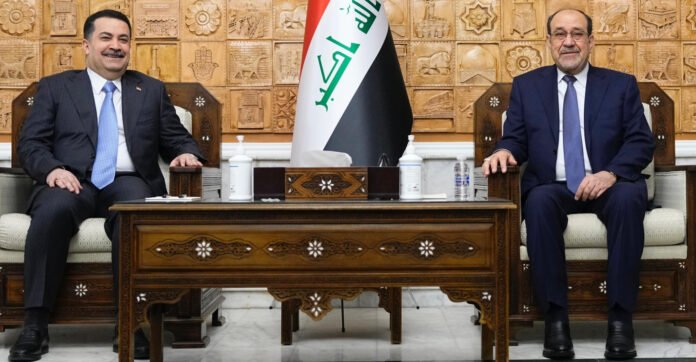Iraq is entering a tense election season. The Shiite political rivalry in Iraq between Mohammed Shia al-Sudani and Nouri al-Maliki dominates headlines. Both leaders, once allies within the Coordination Framework, now compete for influence over Iraq’s Shiite landscape. This rivalry is shaping strategies across Baghdad and southern provinces. It makes the November 11 elections one of the most closely watched contests in years.
Al-Sudani, Iraq’s current prime minister, and al-Maliki, former premier, are presenting different political visions. Al-Sudani leads the Reconstruction and Development Coalition, which unites seven groups. These also include the Euphrates Movement and Karbala Innovation Alliance. Analysts say the coalition emphasizes institutions and alliances, highlighting al-Sudani’s bid to attract centrist and reformist voters.
By contrast, al-Maliki heads the State of Law Coalition. His camp aligns with factions linked to armed groups, including Asaib Ahl al-Haq and the Fatah Alliance. This alliance positions him as a hardline candidate and strengthens his long-standing influence in southern Iraq. Observers argue this division reflects not just personal competition but also structural tensions within the Coordination Framework.
Additionally, supporters of al-Sudani claim his leadership bolstered stability. They cite his handling of the June Israeli–Iranian conflict and his broad coalition-building skills. Baghdad analysts highlight his diplomacy and ties with Washington. These moves have raised his profile but also stirred concerns among Coordination Framework members wary of his independence. Meanwhile, al-Maliki’s camp argues he can block al-Sudani from securing another term. They present State of Law as decisive in shaping Iraq’s next government.
The rivalry plays out across provinces. Al-Maliki retains strong support in Basra, Dhi Qar, Maysan, Karbala, Najaf, as well as Babil. Al-Sudani gains traction in central and northern provinces. Baghdad remains the crucial battleground, with 71 seats likely to determine which coalition leads.
The Independent High Electoral Commission set the election for November 11. Campaigns will run from October 8 until 24 hours before voting. About 30 million Iraqis are eligible to vote from a population of 46 million. Analysts believe the Shiite political rivalry in Iraq will shape turnout and post-election coalitions.
This election will test the Coordination Framework’s cohesion. It may reveal whether al-Sudani or al-Maliki redefines Iraq’s Shiite political future. The stakes are high as both aim to expand influence, secure policy control, and claim victory. The Shiite political rivalry in Iraq remains central to the outcome.


